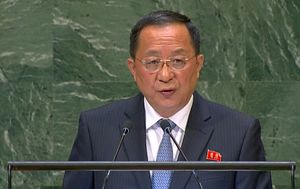As we head into a new round of U.S.-North Korea talks this year, with a scheduled upcoming trip to Pyongyang by U.S. Secretary of State Mike Pompeo and a likely second summit between the leaders of both countries, there’s growing evidence that what Pyongyang is seeking above all — above a declaration to end the Korean War and above further limitations to U.S.-South Korea military engagements — is sanctions relief.
The first piece of evidence to support this came over the weekend, when North Korean Foreign Minister Ri Yong Ho delivered an address to the United Nations General Assembly. Ri isn’t driving North Korean policy, but was in New York as the regime’s top emissary. Before gathered world leaders and foreign ministers, he took aim at UN and unilateral U.S. sanctions on his country:
The UNSC poured down on us numerous “sanctions resolutions” making issue of our nuclear tests and rocket test launches. But even today, when one whole year has passed since such tests have been stopped, even a word in those “resolutions” remains unchanged to say nothing about being totally removed or eased.
Ri was speaking just weeks after Kim staged a remarkably muted military parade to commemorate the 70th anniversary of North Korea’s founding. Unlike preceding parades in February 2018 and April 2017, this one featured no nuclear-capable systems. North Korea’s general restraint this year, Ri was saying, should have merited an easing in international sanctions. North Korea isn’t alone in this position; Beijing and Moscow, two permanent members of the United Nations Security Council, have voiced their support for limited sanctions relief to provide North Korea with positive reinforcement.
Aside from Ri’s speech, the Korean Central News Agency ran a significant commentary on Tuesday. This commentary notably put to rest a proposal that has been put forward by several U.S. and South Korean experts: that the United States agree to move forward with a declaration to end the Korean War in exchange for a North Korean declaration of its nuclear inventory. (I explored some of the difficulties with an inventory here for NKPro.) This “declaration-for-declaration” proposal has few takers in Pyongyang, it would seem.
Per the commentary, the end of war declaration is seen in North Korea as entirely separate from the denuclearization track in talks. “The issue of the war-end declaration should have been resolved half a century ago,” the commentary notes. “It is also the most basic and primary process for the establishment of new DPRK-U.S. relations and peace mechanism on the Korean peninsula, to which the U.S. was also committed.”
In this reading, North Korea suggests that commitments U.S. President Donald J. Trump had made to Kim in Singapore leave the end of war declaration as a foregone conclusion. On denuclearization and U.S. “corresponding measures,” which had most recently been alluded to in the inter-Korean declaration of September 19, the commentary suggests again that sanctions are the key to unlocking further progress, including potentially action at North Korean nuclear sites, including the facilities at Yongbyon:
The DPRK is taking substantial and crucial steps to implement the joint statement made at the DPRK-U.S. summit, but the U.S. is still trying to subdue someone by resorting to sanctions, oft-repeating the story about escalation of sanctions pressure on the DPRK.
As an accompaniment to the above observations, consider that South Korea too has picked up on the inadvisability of the “declaration-for-declaration” approach. As the Washington Post reports, South Korean Foreign Minister Kang Kyung-wha has expressed reservations about this idea. (She isn’t the first member of South Korean President Moon Jae-in’s government to voice reservations on a North Korean inventory declaration.)
”What North Korea has indicated is they will permanently dismantle their nuclear facilities in Yongbyon, which is a very big part of their nuclear program,” Kang said during a discussion at the South Korean mission to the United Nations, according to the Post. “If they do that in return for America’s corresponding measures, such as the end-of-war declaration, I think that’s a huge step forward for denuclearization.”
This sets up another potential exchange, whereby the United States agrees to a declaration to end the Korean War and North Korea puts Yongbyon on the table. That in itself is different from the exchange North Korea is proposing, but notably sidelines the inventory declaration issue too. South Korea, understandably, is not calling for sanctions relief just yet. (Seoul has limited leverage to push for sanctions relief, even if Moon may privately welcome relief to enable his inter-Korean economic agenda.)
Kang’s proposal, however, demonstrates South Korea’s only limited concern with denuclearization and primary pursuit of inter-Korean rapprochement. The value in an inventory declaration—however incomplete—is to gauge North Korea’s seriousness and to also demonstrate that the focus remains on the entirety of Pyongyang’s program, not just Yongbyon. As significant and well-known as the facilities at Yongbyon are, North Korea has a wide range of other facilities—covert and overt—that merit inclusion in a comprehensive denuclearization process.
Looking ahead to Pompeo’s impending return to Pyongyang—his fourth trip — it’s unlikely that we’ll see a fundamental recalibration in U.S. objectives. The State Department has made clear that it continues to see “maximum pressure” as staying in place until further concessions on denuclearization emerge. What should be clearer is that ‘declaration-for-declaration’ appears to be the wrong approach to making any progress with North Korea on the denuclearization issue right now.

































